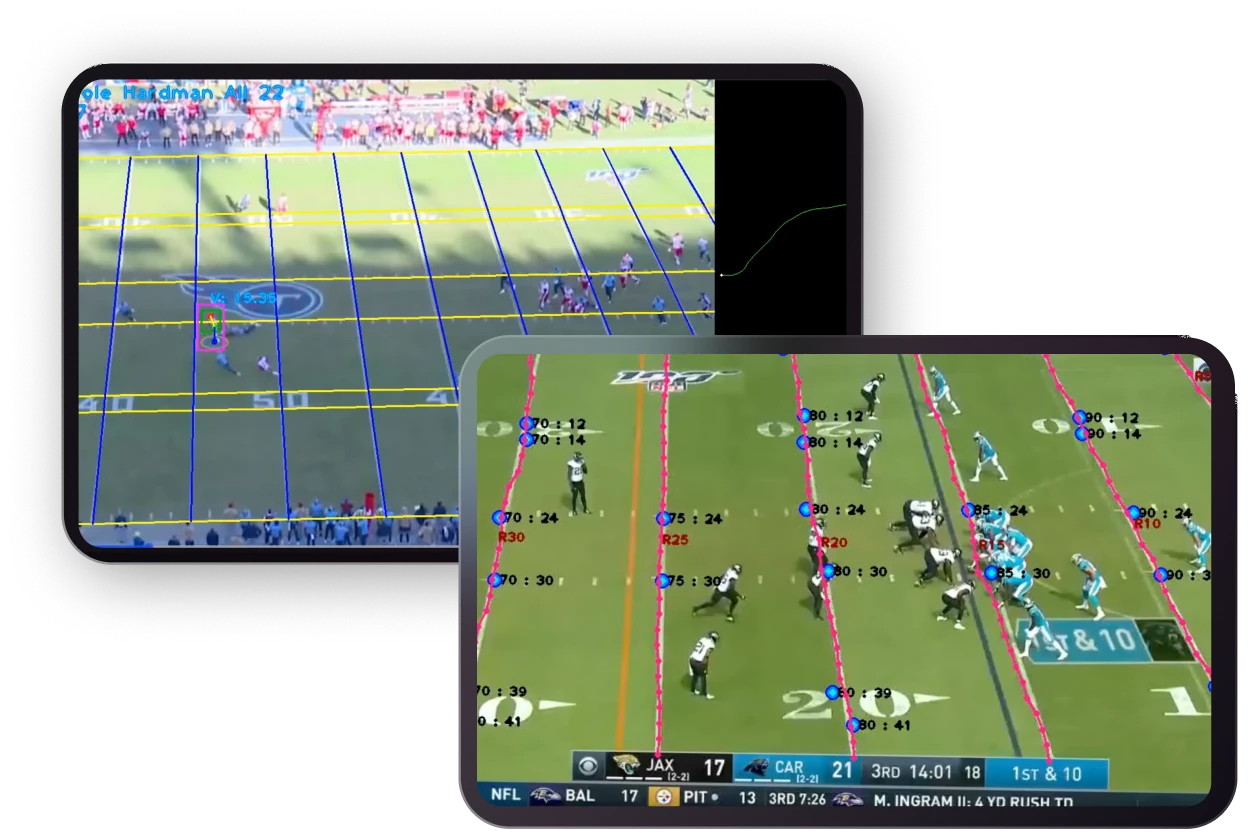The adoption of AI in sports is rapidly growing. According to predictions, in 2025, the AI in the sports market size will hit a record of 3.1 billion USD. AI technology expands the capabilities of traditional athlete coaching. It offers accurate analysis, precise monitoring, and more effective program development. Today, we invite you to discover the possibilities of AI sports coaching technology. We will review core tools, challenges, limitations, and perspectives for the future. So, let's begin.
Core AI technologies in sports coaching
In our experience, sports coaches employ a whole set of AI-powered technologies to improve athletes' results, training effectiveness, and the success of the entire preparation program. However, we consider machine learning, computer vision, and deep learning real game changers in training sessions. Let's look closer at each segment and its impact on modern coaching.
Machine learning in AI coaching
Machine learning, or ML, dominates the AI sports market, seizing 41% of AI technology segments. Alongside data analytics, ML enables the productive development of in-match strategies. It analyzes real-time data and helps to understand the opponent's tactics. Such an analysis supports the creation of more effective player rotation and a strategy for beating the opponent's plans. AI-driven insights ensure better decision-making, optimize training programs, and significantly reduce the risk of injury.
With machine learning, coaches can analyze player statistics more effectively, identifying all players' performance habits. They can use predictive models to create and tailor training loads according to specific athletes' needs and previous success rates.
ML algorithms are a powerful source of possible risk predictions. They calculate the potential danger based on data on training intensity, previous injuries, and current fatigue level.
Computer vision as a powerful AI sports coach
Sports coaches often use computer vision (CV) for movement tracking. CV enables accurate biomechanical assessments by analyzing athletes' actions, posture, and techniques through AI-powered cameras. Artificial intelligence can compare sportspeople's moves with professional standards. By analyzing all evaluated data, sports coaches can provide more precise feedback and choose a course for further corrections.
Computer vision identifies risky movement patterns to prevent potential injuries and enables efficient training modification to reduce strain on muscles and joints. It allows applications to offer AI-powered real-time coaching enhanced with voice-guided corrections.
Also, computer vision is a helpful tool for precise game analysis. It can help to identify weaknesses in opponents' strategies and optimize the team's performance.
Read about AI's role in modern sports betting
Deep learning for AI-powered coaching
Such advanced machine learning techniques as deep learning can enhance training aspects, including performance analysis, strategy development, and training optimization.
Deep learning models use video footage, sensors, and wearable devices to process and analyze data. For example, with the help of slow motion, coaches can break down the athletes' form, technique, and posture to ensure they act as effectively as possible.
DL allows the detection of early signs of overtraining and indicates poor biomechanics and excessive strain on muscles and joints. It helps to develop personalized recommendations specifically for certain athletes and reduce the possibility of damage to their health.

How AI is Transforming Sports Coaching
Modern sports and constant competition push coaches to look for advanced solutions for productive, effective, and safe training sessions for their athletes. Let's see how AI in coaching can improve athletes' abilities and the entire approach to training.
Movement and technique analysis
Coaches need access to accurate data about athletes' performance, and computer vision ensures this through motion tracking and accuracy assessment. Advanced technology allows trainers to analyze and evaluate each workout step, assess biomechanics, and get real-time feedback on form and technique. CV greatly enhances coaches' capabilities, providing them with all the information about body angles and positions. Such an approach ensures that all exercises are performed correctly.
Coaches apply AI-driven video analysis to identify weaknesses in performance, strengths, and patterns. They can instantly compare current effectiveness with previous sessions and monitor the athletes' progress. With instant feedback, coaches can adjust the training, personalize it, and enhance athletes' development much faster.
Training optimization
Training optimization is the key to athletes' professional growth. Coaches must consider age, body condition, positions, and competition schedules to maximize performance. Artificial intelligence helps to keep an eye on everything, adjusting training intensity in the process and tailoring personalized training plans.
Artificial intelligence utilizes biometric data to help select the most effective exercises for certain athletes. With AI-driven insights, coaches can concentrate on weak sides and avoid potential risks. For example, AI can help develop the training program by considering the injury history and current fatigue levels.
Injury prevention and athlete monitoring
Athlete safety is one of the main focuses during training sessions and competitions, so companies invest a lot in risk mitigation. Injury prevention is based on constant monitoring to reduce the risks of health damage through workload and fatigue analysis.
For one of our clients, we created muscle fatigue estimation system to enhance the athlete's health protection. Utilizing Bitalino MuscleBIT and the Open Signal application, we have achieved accurate EMG data collection for further processing via convolutional neural networks. Our model classified muscle activity in 91% of the validation data processing and 89% of the test data. Compared to a traditional approach, CNN allows smoother results during muscle fatigue tracking and shows how the athletes feel.
![]()
AI algorithms collect data from all available sources, then combine and evaluate it to indicate and recognize present patterns. With such a technologically advanced approach, coaches can more accurately identify problems, including subtle movements that could signify potential strain. Or they can indicate that improper exercise performance can lead to trauma. Timely alerts help coaches adjust workouts in time and avoid injuries.
AI in performance analysis and strategy
Artificial intelligence transforms the way coaches analyze matches and develop new game strategies. Through accurate processing of huge data amounts, AI enables smart and information-driven tactical decisions, gives access to player performance evaluation, and allows its optimization. So, how exactly does AI make it possible?
-
Advanced machine learning algorithms precisely analyze the in-house team's strategy and the opponent's tactics. AI indicates strengths and weaknesses and simulates scenarios to show which strategy would work better in specific situations;
-
AI-powered match analysis enables effective breaking down of the game to identify key moments and evaluate the efficiency of players. Automated breakdown offers statistics on possession, shot quality, defensive efficiency, and other factors valuable for specific sports types;
-
AI applications are equally valuable for both team and individual sports. For teams, AI can analyze their formations, provide recommendations for defensive or offensive tactics, and evaluate team coordination. For individual athletes, AI focuses on individual technique and biomechanics to optimize training routines.
Challenges and Limitations of AI in Sports Coaching
According to our experience, you can effectively utilize artificial intelligence in coaching only if you know, understand, and consider the main challenges of AI use. Let's review the biggest concerns to prepare you for modern technologies and their responsible implementation and leveraging.
Accuracy and reliability of AI models
AI-powered predictions depend on the data quality you use for model training, and errors and mistakes can lead to incorrect results and false judgments. During model preparation, you must ensure that you feed high-quality data that is complete, correct, and free of biases. For example, if historical data favors certain play styles or backgrounds, the AI model can consider anything beyond the pattern less preferable. Artificial intelligence may also fail to consider external factors, including unexpected weather changes or a player's emotional state.
The fear that AI will replace human coaches
Artificial intelligence has a wide range of functionality, and this factor raises the concern that one day, AI will just replace coaches, causing job displacement. What will happen if AI excludes the need for human decision-making skills?
At Requestum, we believe that complete replacement will never happen. Artificial intelligence is a helpful tool that aims to enhance human coaches' capabilities and make their work more effective.
The athletes need human presence during training and competition, as coaches can offer irreplaceable motivation, emotional intelligence, support, empathy, and leadership. They can actively use AI-driven data but still rely on intuition and personal experience to make important decisions for athletes' development.
Case Study: AI-Powered Football Player Performance Analysis

Data privacy risks
One more concern is data privacy. When artificial intelligence collects data from various sources, from video footage to wearable devices, it may be hard to tell who owns the data and how it will be used. If athletes get injured, the data about their health state and performance metrics can negatively impact their careers in case of leaks.
Prejudice: AI coaching is only for professionals
Artificial intelligence and related technologies are often associated with professional athletes, raising the concern that they would be unavailable for amateurs. Traditionally, AI systems are expensive and require equipment like high-tech sensors and computers, cameras, wearable devices, various tools for performance tracking, etc. It creates the feeling that wealthy players will have an advantage unavailable to lower-budget teams.
However, more advanced tools and solutions like video analysis software are still hard to get. In that case, basic ones like smartwatches and fitness bracelets are available for amateur users and can offer valuable statistics, too.
The "black box" problem: AI decision-making transparency
If humans can explain what drives their decisions at any time, AI models usually don't explain their choices. Coaches cannot trust AI-driven recommendations if they don't understand how the machine comes to such a conclusion. For example, AI can recommend changing tactics or replacing the player without arguments about why it should happen. Biased recommendations can go unnoticed because of unclear reasoning and cause problems in the future.

The Future of AI for Sports Coaching
As you can see, AI in the sports industry is transforming the way coaching works. Now we’d like to share our vision of what the future holds for this powerful technology.
Self-learning AI systems: will they replace human trainers?
Artificial intelligence is powerful for self-learning and development based on experience, but we believe that AI will not replace humans. It will become an even more powerful tool for human coaches to boost traditional training sessions with a modern approach, accurate statistics, precise analysis, and valuable data.
AI integrations with VR and AR for next-gen simulations
Virtual and augmented reality experiences can become the new word in training approaches. Simulation can create a realistic but, at the same time, safe and controlled environment for skill development. Coaches will have access to real-time performance analysis and can provide instant advice and recommendations, adjusting the strategy or style in progress.
Let’s turn your vision into smart software
Cognitive AI models: mental endurance and performance predictions
Such models can teach AI to differentiate and indicate human mental state, stress, and concentration levels. It will help to analyze and predict how events can impact athletes' performance and adjust training to match their current physical and mental condition. For example, AI will recognize emotions better, track brain activity, and optimize recovery plans.
Coaches + AI: The future of hybrid coaching?
Hybrid coaching is the basis for future training sessions and athletes' preparation for competitions. When combined with human coaching and AI technology, AI will boost possibilities to a new level through real-time insights, predictions, monitoring, and state evaluation. AI is the key to creating individual training plans tailored to the needs of each athlete.
Conclusion
Artificial intelligence has already started to play an important role in modern sports coaching. It empowers the processes with statistics, data about the physical state of athletes, performance evaluation, and predicts possible outcomes of development strategies and future matches. However, while AI raises concerns about data privacy, decision-making transparency, and accessibility, it still shows great potential for development in the sports industry.
If you are looking for a solution that will increase the effectiveness of your training sessions, improve risk mitigation, or provide precise insights and forecasts, we know how to help you. Contact us, and we will create a solution tailored specifically to your sports type, requirements, and goals.

Our team is dedicated to delivering high-quality services and achieving results that exceed clients' expectations. Let’s discuss how we can help your business succeed.


SHARE: